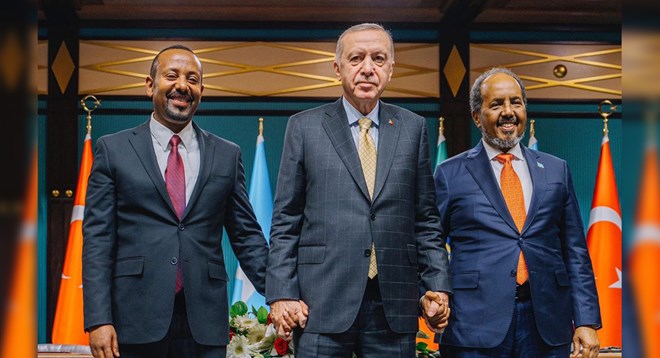
Sunday December 15, 2024

The international community has commended the agreement signed this week between Ethiopia and Somalia, with many hoping the deal will put an end to the tensions that have marred relations between the two countries for a full year.
The agreement, facilitated by the Turkish government, entails a pledge from Ethiopia to respect Somalia’s territorial sovereignty while the latter has agreed to provide sea access for landlocked Ethiopia. The two countries are set to begin technical negotiations in February 2025, with hopes of reaching a full agreement by June.
advertisements
The Ankara Declaration also secures Mogadishu’s approval towards the participation of Ethiopian troops in the upcoming African Union Support and Stabilization Mission in Somalia (AUSSOM), which is scheduled to begin next month.Somali President Hassan Sheikh’s administration had previously been adamant that Ethiopia should not be allowed to contribute troops to the AU-led peacekeeping mission (the third of its kind) without a retraction of the MoU it signed with breakaway Somaliland nearly a year ago.
Nonetheless, the Ankara deal made no mention of the controversial MoU, leaving room for speculation. Analysts who spoke to The Reporter had differing opinions on what the deal will mean for Somaliland.
Some assert that Ethiopia’s agreement to respect Somalia’s territorial sovereignty in return for maritime access indirectly dissolves the MoU. Proponents of this view also argue that the freshly-elected administration of Abdirahman Mohamed Abdullahi (Irro) is not as keen on the deal as the preceding administration under Muse Bihi, pushing Ethiopia to silently abandon the deal.
Other analysts argue that Ethiopia has not abandoned the MoU, instead reaching an agreement with Mogadishu to make certain it would permit Ethiopian peacekeeping troops to take part in AUSSOM. They contend Ethiopia currently values its presence in Somalia over the MoU, particularly in the interest of counteracting Egyptian military influence in the Horn and the resurrection of Al-Shabaab.
Türkiye’s facilitation of the agreement has garnered global appreciation, but questions about its growing interests in Somalia have also been aired. The two countries signed a military pact in February that would grant Ankara a significant portion of the revenues generated in Somalia’s exclusive economic zone (EEZ) in exchange for protection and training.
Although many praise the deal between Mogadishu and Addis Ababa, some view it as a diplomatic disaster for the administration of Prime Minister Abiy Ahmed, although even they concede that a de-escalation of tensions is a huge win for the Horn region.
The AU, UN, IGAD, ATMIS, and Washington are among those who have commended the Ankara accord.
“USA welcomes the agreement reached between Somalia and Ethiopia reaffirming each country’s sovereignty, unity, independence, and territorial integrity and advancing cooperation on shared interests. We appreciate the leadership of Türkiye in facilitating this Declaration. We look forward to technical negotiations to permit Ethiopia to enjoy reliable, secure, and sustainable access to the sea for mutual economic benefit while respecting Somalia’s territorial integrity,” reads a statement from the outgoing Biden administration. “We encourage Ethiopia and Somalia to intensify their cooperation on mutual security interests, particularly the fight against al-Shabaab, and look forward to continuing our close bilateral cooperation with both nations.”
Meanwhile, recent reports indicate the incoming Trump administration has plans to push for the recognition of Somaliland.
Somaliland’s new President, Abdirahman Irro, said that Somaliland would not “beg for what is rightfully ours” during his inauguration ceremony on December 12, 2024.
Former President Muse Bihi, who signed the MoU with Ethiopia eleven months ago, peacefully transferred power to Irro on the same day that PM Abiy and Hassan Sheikh signed the Ankara accord.
“The new president of Somaliland said his administration has not been privy to the MoU’s details. He also said his administration would hold talks with Mogadishu. All this indicates that Hargeisa will normalize relations with Mogadishu under the new administration, unlike Muse Bihi’s administration,” predicted Costantinos Berhutesfa (PhD), a geopolitical analyst and former anti-graft commissioner at the AU.
He believes the Ankara agreement is advantageous for both Ethiopia and Somalia.
“The international diplomatic pressure Somalia has put on Ethiopia since the MoU has now come to an end. Somalia has no reason now to escalate tensions with Ethiopia,” said Costantinos.
He observes the growing feud between the Somali state of Jubaland and Mogadishu, which erupted in armed conflict recently, has placed the latter under pressure.
“Hassan Sheikh needs the service of the Ethiopian peacekeeping mission now more than ever. Ethiopia also has no option at this point but to normalize relations with Mogadishu, until the position of Somaliland under the new administration becomes clear,” said Costantinos.
He predicts that both Ethiopia and Somalia will overlook the MoU for the foreseeable future in the interest of preventing the strengthening of Al-Shabaab. Costantinos said the deal was inevitable as international pressure on both countries had mounted in light of fears of a major crisis in the Horn of Africa.
“There is also international pressure to persuade Ethiopia and Somalia to agree. Dozens of global powers have military bases in the Horn of Africa. If Ethiopia and Somalia go to war, the region will descend into chaos. That means the global powers will also be divided on the Horn’s issues, and might resort to proxy wars through their military bases. This would be a huge crisis, “ he said.
Costantinos notes the Ankara Declaration does not include provisions for an Ethiopian coastal military base, and that it does not rule out the recognition of Somaliland.
“Somaliland still has hope. The international community might decide in favor of its recognition of statehood. The Ankara agreement does not exclude that completely,” he said.